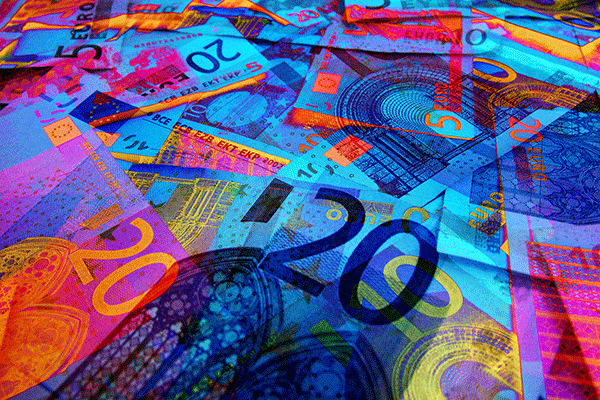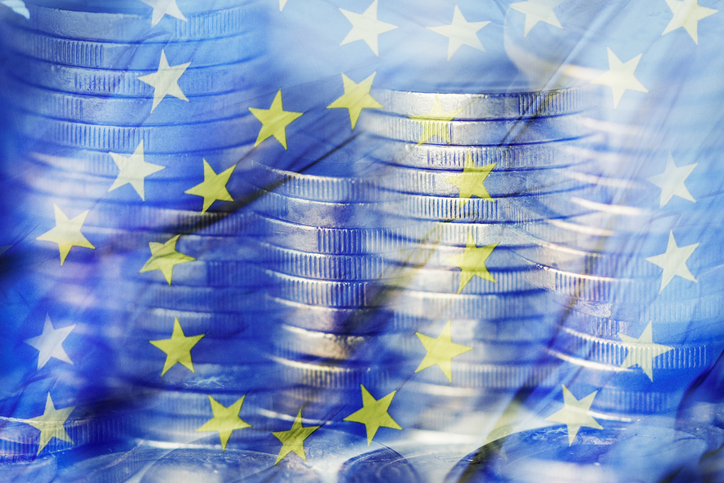Reasons to invest in Europe, despite recession risk and Russia
24th October 2022 11:06
by Ceri Jones from interactive investor
Investing in Europe appears more basket case than bargain. However, as Ceri Jones reports, the region is home to some of the world’s most exciting companies.

Europe’s immediate future looks bleak as Russia’s invasion of Ukraine continues to drive up energy and food prices, adding to inflationary pressures. The OECD’s latest Interim Economic Outlook predicts that dependency on gas for heavy industry and heating will plunge Germany, Italy, and possibly France, into a long period of recession.
Overall, eurozone growth is forecast to fall from 3.1% this year to just 0.3% in 2023, with the German and Russian economies set to shrink next year by 0.7% and 4.5% respectively, and Italy’s estimated to grow by only 0.4%.
- Find out about: Free regular investing | Interactive investor Offers | ii Super 60 Investments
Plenty of bearish investors shying away
“The region is facing a uniquely negative economic outlook driven by high energy prices,” says Ian Samson, a multi-asset fund manager at Fidelity International.
Samson adds: “Consumer confidence is plunging, and there are already signs of industry shutting down production due to spiralling energy costs.”
At the same time, inflation in the eurozone is accelerating faster than expected, according to Eurostat, the statistical office of the European Union, which has calculated that annual inflation will reach 10% in September, up from 9.1% in August.
“European Central Bank (ECB) president Christine Lagarde has signalled that more rate hikes will be needed to rein in inflation, impacting just as industrial activity may be hit by energy shortages,” says Michael Walsh, an investment strategist at T Rowe Price.
Walsh continues: “The proximity of Europe to Ukraine and its reliance on Russian natural gas may weigh further on its equity market as we move towards winter. A new government in Italy adds to existing political uncertainty. In an environment where the outlook for economic growth globally is darkening, the more export-oriented nature of economies such as Germany may act as an additional burden.”
- Where to invest in Q4 2022? Four experts have their say
- The bombed-out cyclical shares the pros are buying
- Top-performing fund, investment trust and ETF data: October 2022
The eurozone could even be at risk of a meltdown similar to the recent bond crisis in the UK, leaving the ECB little choice but to follow the Bank of England by stepping in to calm markets. The European Systemic Risk Board – a part of the ECB – has warned of “severe risks” to financial stability from tumbling global markets and fragility in the eurozone’s housing market.
Most multi-asset and global managers have been underweight the region since the invasion.
“We generally hold less than benchmark weights in European stocks within our multi-asset portfolios, preferring companies in Japan and emerging markets,” says Walsh.
He adds: “Our European investment committee has been negative on equities for much of the year, preferring cash and, more recently, government bonds to anchor portfolios in uncertain markets. We are positioning for peaking inflation expectations, imminent economic slowdown and perhaps a recession globally.”
But there are reasons to be positive
Of course, Europe is a diverse market, covering a variety of countries, which perform differently. In Italy Giorgia Meloni’s right-wing Brothers party has won a clear mandate, but rising debt, inflation, anaemic growth and an ageing population are major obstacles to her promised “national reawakening” and she is unlikely to resist the temptation to overspend, especially as pressure to ignore EU demands is mounting.
German businesses are strongly linked to global supply chains, and many face the challenge that to remain competitive, they must implement changes prioritising security and operations at the expense of reduced profitability.
Yet barring Germany, European markets have not fallen by as much as might have been expected and not by as much as their US or China rivals. To date, they have been supported by better-than-expected second quarter economic growth, with activity remaining high among key manufacturers. EU unity has also been robust and much of the fiscal assistance agreed during the pandemic is still being disbursed.
For stock pickers running a European mandate, however, the region has always had something to offer, rich as it is in companies that are global leaders in their fields or niche industries. There is depth in certain sectors, even compared with markets such as the US, and many European companies have prioritised environmental, social and governance (ESG) measures in their business models, gaining a competitive edge.
“While an uncertain economic outlook in Europe persists, it is worth remembering the international nature of European companies, where approximately 50% of corporate revenue comes from outside the region,” says Dzmitry Lipski, head of funds research at interactive investor.
Lipski adds: “This suggests that while investors should remain cautious in the near term, the main focus should be on individual company prospects rather than the wider economy.”
- Funds and trusts four professionals are buying and selling: Q4 2022
- Ian Cowie: this trust duo fight against humanity’s unseen enemies
Mark Denham, head of European equities at Carmignac, points out: “These companies are not overly exposed to Europe to generate profits, nor do they only have European operations.”
“Some of the healthcare stocks we invest in are innovating leaders in the treatment of diabetes, obesity, or rare diseases – worldwide issues. Ageing demographics, technology innovation and an increasing focus on well-being are global trends which are at the very core of the business case around some stocks, especially in the medtech sub-industry.
“Digitisation and cloud computing, greener economies, energy-efficient buildings, electrification and alternatives to fossil fuels are also characteristic of the technology, industrials or renewable energy themes we have in the fund. These are businesses with an attractive long-term investment horizon.”
Over the mid- to long-term, volatile markets and exogenous shocks always pass and often create opportunities in proven secular growth stocks that can sustain profitability and growth.
Denham advocates the healthcare environment “which can be growth-y and somehow defensive at the same time, thanks to the visibility of its earnings”, citing opportunities across the sector, such as the more traditional drugs producers or B2B suppliers, innovative biotech, as well as medtech.
He points out: “Renewable energies are also very interesting, especially given the European world-class leaders in the space – i.e. wind – and the regulatory environment, which is nowadays more supportive than ever. Further exciting investments are in consumer excellence, companies which have a clientele that can weather the current inflationary environment more easily than others, particularly within the luxury sub-industry.”

Investing in Europe versus the US
If markets continue to fall, then at some point stocks will reach attractive valuations. “In the current market environment, reasons to be bullish are few and far between,” says Marcus Morris-Eyton, portfolio manager at Allianz Global Investors.
Morris-Eyton adds: “Consensus is very much pointing towards a recession. While, I am not going to attempt to forecast the length and depth of a recession, we are certainly approaching valuation levels in parts of the market where much of that bad news already appears discounted in the price.”
“For years Europe has been viewed as the poorer relation relative to the US, and there is no denying that the US stock market is home to more high-quality companies than Europe. However, within Europe we have some of the world’s most exciting companies, that are helping shape some of the world’s most important innovations.
“This is particularly evident in the semiconductor sector, luxury goods, industrial technology, and sustainability. With the region currently unloved, it is possible to find a few of these brilliant companies at attractive valuations.”
- High-yield trusts investors are buying that beat top savings rates
- Market jitters cause investors to dump passive funds
Fidelity’s Samson is sceptical. In Europe, he prefers consumer staples names, and is avoiding industrials. “The former provide more defensive exposure, and should be able to largely pass on their input cost pressure to consumers to protect margins. Conversely, industrial demand will be hit by the global and Chinese cyclical downturns, while sky-high energy costs will leave the companies literally struggling to keep the lights on over winter.
“This does not seem fully priced in markets. For those with greater near-term risk tolerance, European retailers (the likes of Marks & Spencer Group (LSE:MKS), Hennes & Mauritz AB Class B (XETRA:HMSB), and Inditex, which own brands including Zara) have sold off to an extreme, remain good quality companies, and may well present a buying opportunity - even though discretionary consumer spending in coming quarters will be depressed by energy costs.”
Fund ideas
For active core/income exposure, Lipski suggests BlackRock Continental Europe fund, which yields more than 4% and is invested in quality European companies with sustainable and growing dividends, with a bias to the healthcare, financial and industrial sectors.
For higher risk/reward capital growth, Lipski suggests The European Smaller Companies Trust (LSE:ESCT), which is invested in more than 120 smaller European companies with exceptional growth potential. The trust also pays dividends with a current yield of 2.5%, which should support total returns in periods of market volatility. The value-driven process is likely to result in a portfolio that is quite different to its peers and, therefore, the fund could complement a core European large-cap equities fund such as the BlackRock Continental European Fund, or a passive fund such as Vanguard FTSE Developed Europe UCITS ETF GBP (LSE:VEUR), providing diversification benefits within a broadly spread portfolio.
These articles are provided for information purposes only. Occasionally, an opinion about whether to buy or sell a specific investment may be provided by third parties. The content is not intended to be a personal recommendation to buy or sell any financial instrument or product, or to adopt any investment strategy as it is not provided based on an assessment of your investing knowledge and experience, your financial situation or your investment objectives. The value of your investments, and the income derived from them, may go down as well as up. You may not get back all the money that you invest. The investments referred to in this article may not be suitable for all investors, and if in doubt, an investor should seek advice from a qualified investment adviser.
Full performance can be found on the company or index summary page on the interactive investor website. Simply click on the company's or index name highlighted in the article.